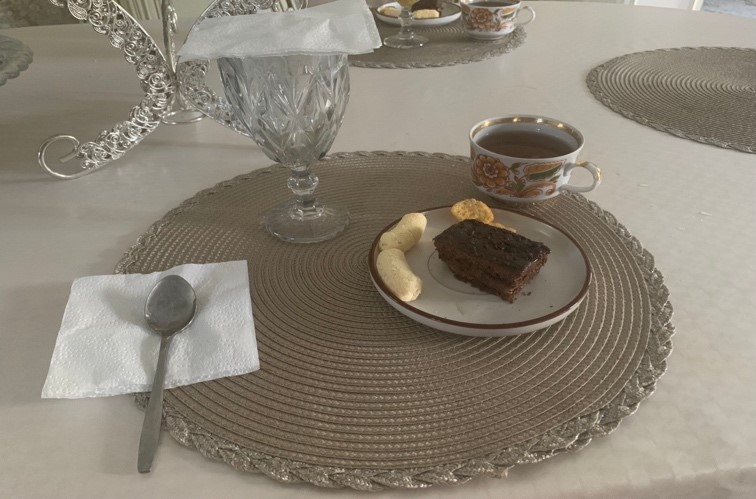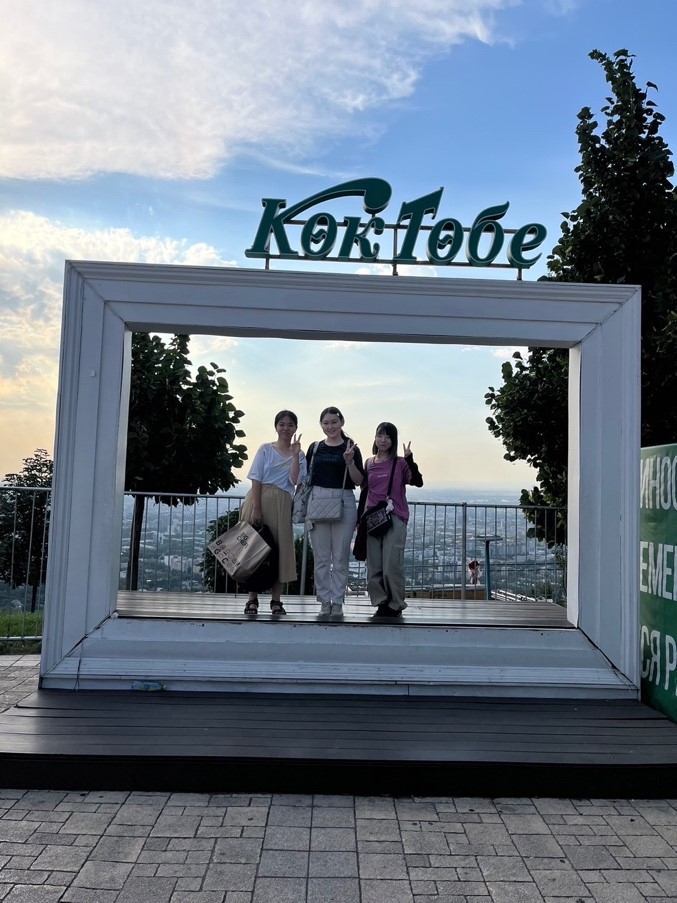Training Report
Graduate School of Comprehensive Human Sciences, Degree Programs in Comprehensive Human Sciences
Yamagata Sumika (2nd year)
When I was an undergraduate, I had a desire to study abroad, but that desire was never fulfilled because three of my four years were due to the COVID-19 pandemic. However, when I went on to the master’s program and had been thinking about this desire for a long time, I came across a poster for a Kazakh language training program and decided to apply for it since it was my last year as a student. I decided to participate in the fascinating study abroad program at the University of Tsukuba with a light heart, hoping that it would be a good opportunity to take a break and reflect on myself.
I participated in the Kazakh language training this time, but there were other people who participated in the Kyrgyzstan training program at the pre-training orientation, and everyone else had a good motivation for participating, such as being interested in Russian-speaking culture, so I was honestly worried about whether I should participate with such a slight interest. However, I went to Kazakhstan with anxiety and anticipation, because what I had experienced so far would someday be connected to something in the future.
Areas of improvement after the training
Before the training, I was unable to speak Kazakh or even read the words, so I was worried about whether I would be able to keep up with the classes, whether I would be able to get along with my host family and the local people while learning the language in Central Asia, a place I had never been to before, and about safety and infectious diseases, so I checked the Ministry of Foreign Affairs’ website many times before traveling. I also had the experience of studying abroad in a non-English speaking country when I was in high school, and while I could not speak English or the language of that country, I did not dare to go out alone on holidays, etc., and tended to stay in the dormitory, so I had an impression of what it would be like this time. I had a variety of experiences during my training, but there were two areas in which I grew significantly.
The first is the ability to communicate my intentions clearly.
Although I became good friends with my host family during this homestay, the breakfast every day was cake and cookies, which I didn’t like, so I was thinking of talking to my host mother about it. Since I was staying at someone else’s house, it was difficult for me to make the offer directly to her, but for reasons that she could understand, I told her my intention and she listened to my offer, saying that I wanted vegetables and fruits for breakfast because my stomach was not feeling well. However, after a week, breakfast again turned out to be cakes and cookies, and I was feeling it would be difficult to ask my host mother about it, so I decided to consult with the coordinator at the local university. At first, I was hesitant about consulting my teacher, but I felt that I would regret not doing so, so I decided to go ahead and consulted him. He listened to me sympathetically and discussed the matter with my host mother. s a result, vegetables, fruits, and porridge were added to my breakfast, and I’m glad I had the courage to ask for advice. From this experience, I learned that what you say can sometimes move people, so if you have the courage to express your intentions, things will go well.
The second is the ability not to underestimate one’s own strength and to believe in one’s own dormant power.
Since it was a non-English speaking country and English was not widely spoken, in the beginning I went out to eat, went sightseeing, and spent time with friends who could speak Russian and Kazakh. I thought that I couldn’t go on like this, so I decided togo out to eat and sightseeing by myself. It was a great experience for me to be able to communicate with a variety of people, using English and words I had learned in class and sometimes relying on a translation device. The local people were all friendly, and when I couldn’t communicate well and tried to convey with gestures, the other person listened seriously to what I was trying to convey, and I felt that I had overcome the language barrier. I realized once again that we can manage somehow even if we don’t speak the same language. As with anything, before doing something for the first time, I think everyone tends to think things like “Can I do this?” or “Other people are better than me and are amazing; I could never do that.” However, I’ve found that if you don’t think too much about it in detail and just throw yourself into it, it can actually go quite well. From there, I learned that I could draw out more and more of my dormant power, and I felt that I should never underestimate my power and that in the end, it would always turn out the way I wanted it to. In this way, I was reminded of the important fact that if you don’t believe in yourself, you won’t go in the direction you want.
Consideration of training destination (country)
Kazakhstan is a landlocked country surrounded by China, Russia, Kyrgyzstan, Uzbekistan, and Turkmenistan, and is made up of various ethnic groups. Due to the influence of the Soviet era, Russian is also an official language, and currently, it is common to see Russians on the streets who have fled from Russia due to the Russo-Ukrainian war. In addition, the National Kazakh University has a large number of Kazakh students and international students as well as students from Turkmenistan, indicating that Kazakhstan is the economic and educational center of Central Asia. Thus, Kazakhstan plays the role of a center that connects various countries.
Training Outcomes





